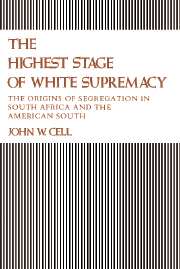Book contents
- Front Matter
- Contents
- Preface
- 1 The Problem of Segregation
- 2 Contemporary Perspectives
- 3 Recent Interpretations of the Origins of Segregation in South Africa
- 4 The Origins of Segregation in the American South: The Woodward Thesis and Its Critics
- 5 The South Makes Segregation: The Economic Interpretation
- 6 The South Makes Segregation: The Social Interpretation
- 7 A Note on Southern Moderates and Segregation
- 8 South Africa Makes Segregation
- 9 Conclusion: Reactions to Segregation
- Notes
- Index
7 - A Note on Southern Moderates and Segregation
Published online by Cambridge University Press: 22 September 2009
- Front Matter
- Contents
- Preface
- 1 The Problem of Segregation
- 2 Contemporary Perspectives
- 3 Recent Interpretations of the Origins of Segregation in South Africa
- 4 The Origins of Segregation in the American South: The Woodward Thesis and Its Critics
- 5 The South Makes Segregation: The Economic Interpretation
- 6 The South Makes Segregation: The Social Interpretation
- 7 A Note on Southern Moderates and Segregation
- 8 South Africa Makes Segregation
- 9 Conclusion: Reactions to Segregation
- Notes
- Index
Summary
Since the 1940s – when the contradictions posed by the Negro Problem became acutely embarrassing for the makers of American foreign policy, when massive migration was building black political muscle in Northern and Western cities, when Gunnar Myrdal's American Dilemma was systematically destroying the intellectual credibility of segregation – many white historians of the South have approached the region's racial problems with a heavy burden of guilt. Their defensiveness is both understandable and laudable. To paraphrase Sir Winston Churchill's famous comment on Clement Attlee's modesty, we have a lot to feel guilty about.
Viewing the past from the perspective of the civil rights era after 1954, historians have commonly identified segregation with extreme racism. In time this identification proved true. They have regarded segregation as an oppressive, blatantly discriminatory, and satanic system of white supremacy. It was, I have argued, the highest stage of white supremacy. But such a view is retrospective and partial. Segregation needs to be understood not only in the light of the somewhat more liberal and more tolerant standards of a later era in American history but in the context that existed then. That is one of the principal values of a comparison with South Africa. For there, instead of loosening under the combined pressure from African nationalism and an increasingly critical world opinion, institutionalized racism has hardened further into apartheid. The comparison helps us to read the history of segregation in the American South forward as well as backward.
- Type
- Chapter
- Information
- The Highest Stage of White Supremacy , pp. 171 - 191Publisher: Cambridge University PressPrint publication year: 1982



